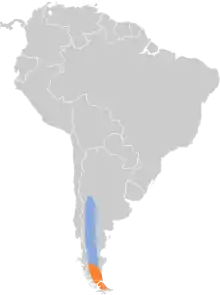Short-billed miner
The short-billed miner (Geositta antarctica) is a species of bird in the family Furnariidae, probably the most southerly breeding passerine in the world. It weighs around 37 grams (1.3 oz)[2] and is typically around 14 centimetres (5.5 in) in length including the tail, which when in flight is distinctively black with white edges. Geositta antarctica can be distinguished for the more widespread common miner by its much shorter bill and the absence of any rufous in the flight feathers.[3]
| Short-billed miner | |
|---|---|
| Scientific classification | |
| Kingdom: | Animalia |
| Phylum: | Chordata |
| Class: | Aves |
| Order: | Passeriformes |
| Family: | Furnariidae |
| Genus: | Geositta |
| Species: | G. antarctica |
| Binomial name | |
| Geositta antarctica Landbeck, 1880 | |
 | |
Its natural habitat is entirely within the Patagonian steppe, and it breeds only in areas rain shadowed by the icy Andes in Santa Cruz Province and Tierra del Fuego. Geositta antarctica migrates as far north as Mendoza during the autumn and winter seasons, but keeps to arid areas, and it is most numerous on heavily grazed grassland on the leeward side of Tierra del Fuego.[3]
Most of its habitat is in sandy soils[4] where it forages for insects singly or in pairs.[5] The nest is a woven cup of grass-like material, placed usually in a burrow[6] and three eggs are laid. There are reports of mixed-species nesting colonies with other Furnariidae species.[3]
References
- BirdLife International (2012). "Geositta antarctica". IUCN Red List of Threatened Species. 2012. Retrieved 26 November 2013.CS1 maint: ref=harv (link)
- Dunning, John Barnard; CRC Handbook of Avian Body Masses; p. 249. ISBN 9781420064445
- Ridgely, Robert S. and Tudor, Guy; The Birds of South America: Vol. II, The Suboscine Passerines, pp. 27–28 ISBN 0292770634
- Short-billed miner. The Cornell Lab. of Ornithology
- Ridgely, Robert S. and Tudor, Guy; Field Guide to the Songbirds of South America: The Passerines; pp. 263–264. ISBN 9780292717480
- Zykówsky, Krzystof & Prum, Rochard O. (1999). "Phylogenetic Analysis of the Nest Architecture of Neotropical Ovenbirds (Furnariidae)" (PDF). The Auk. 116 (4): 891–911. doi:10.2307/4089670.
